#snow rabby
Explore tagged Tumblr posts
Text
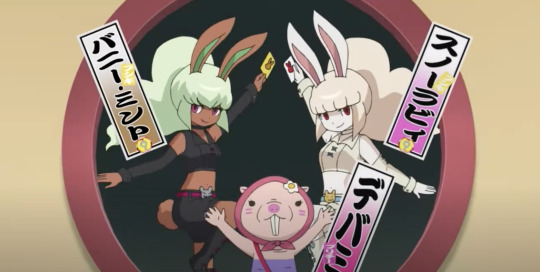
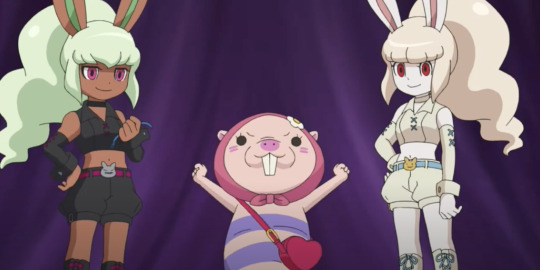
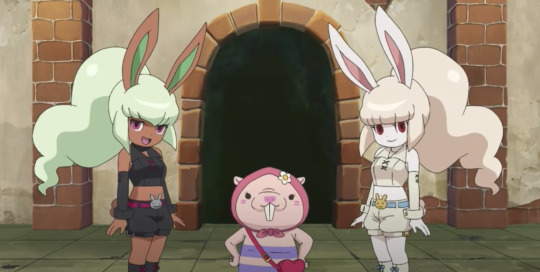

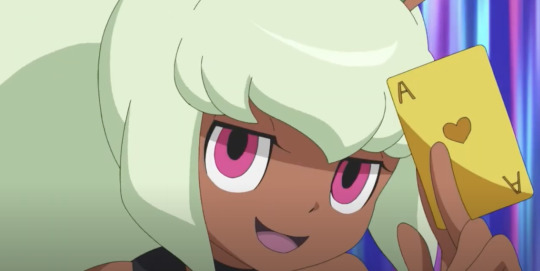
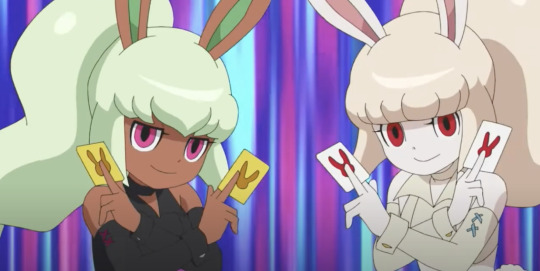
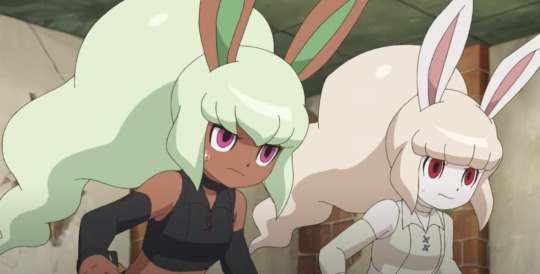
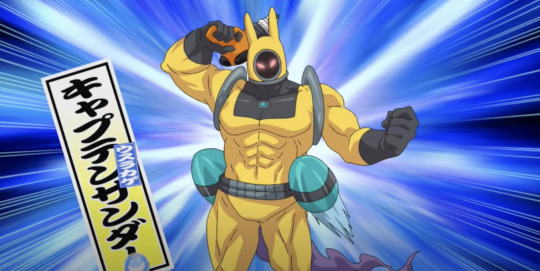
Bunnies and a fruity-looking captain thunder from music note episode 73
I was super confused at first cause the first screenshot I got is almost identical to their introduction in the YW! series so I thought I got it wrong for a moment. But it just looks like they completely recycled the animation (why am I not surprised)
#yokai watch#yo-kai watch#yo kai watch#youkai watch#yokai watch anime#agent spect hare#agent spect-hare#bunny mint#snow spect hare#snow spect-hare#snow rabby#captain thunder
19 notes
·
View notes
Text



Omatsuri Rabby
5 notes
·
View notes
Text

tried my hand at a snow rabby redesign
she kinda bugs me since she's a recolor of. well. so i redesigned her lol. she has albinism now.
my version of snow rabby does snow rescue, basically helping after avalanches to find survivors. so the snow in her name means somethin' now. she has lopped ears!! which i thought of a while back bc it'd be cute and make her look different from bunny mint.
3 notes
·
View notes
Text
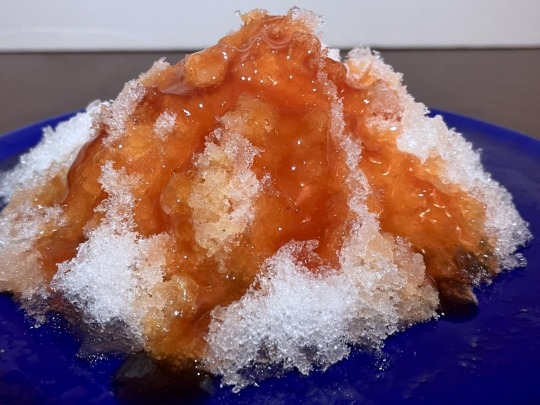
[ID: A pyramid of crystalline snow topped with deep orange syrup on a bright blue plate. End ID]
بقسمة / Buqsuma (Palestinian snow dessert)
بُقْسُمَة ("buqsuma"), or بوظة الشتاء ("būẓa shitā'", "winter ice cream"), is a dessert, possibly of Aramaic origin, eaten in cold and mountainous rural regions within Palestine, Syria, Jordan, Lebanon, and Turkey. It consists of freshly fallen snow topped with grape molasses (دبس العنب; "dibs al-'inab"), date molasses, pomegranate molasses, or storebought snow syrup (شراب الثلج ; "shrāb aṯ-ṯalj"). In Lebanon it may be topped with honey or orange syrup; and in Syria and Lebanon it may also be called سويق or سويقة ("sawīq" or "sawīqa").
Buqsuma is eaten for only a few days a year at the end of the snowy season in February. An old rhyme cautions against eating snow too early in the season:
أول تلجة دم تانية تلجة سم تالتة تلجة كل ولا تهتم
("ʔawwal tallaja damm "tānya tallaja samm "tālta tallaja kul wa lā tahtamm")
("The first snowfall is blood "The second snowfall is poison "The third snowfall, eat and don't worry")
Journalist Hussein Saqr speculates that the intention may be to allow the first snows to clear the air from summer and fall dust and other pollutants before the snow is safe to consume.
During these late winter days, eating and sharing buqsuma becomes a social ritual; guests are invited to share the dessert from a wide platter, or given individual bowls to dress to their taste with syrup, milk, and sugar. Children bring bowls of snow inside and eat buqsuma by the fire to warm up and recuperate from a day at play.
In Syria, buqsuma is prepared especially in the مُحافظة السويداء ("Muḥāfaẓat as-Suwaydā'"; Suwayda Governorate) in the south; in the طرْطوس ("Ṭarṭūs") and إدل�� ("'Idlib") Governorates in the northeast; and along the جبال لبنان الشرقية ("Jibāl Lubnān ash-Sharqiyya"; Anti-Lebanon mountain range) from جبل الشيخ ("Jabal ash-Shaykh"; Mountain of the Sheikh / "Mount Hebron") to the جبال القلمون ("Jibāl al-Qalamūn"; Qalamoun Mountains) in Damascus Governorate.
In Palestine
Within Palestine, buqsuma is eaten only in الخليل ("Al-Khalīl" / "Hebron"), in the occupied West Bank. Palestinian food writer Reem Kassis points out that the regional specificity of the dish is due to the nature of the land: Al-Khalil is one of the few places in Palestine to receive snow.
Al-Khalil is also famous for its viticulture. "It is well known among Palestinians that Al-Khalil grows the best grapes," according to embroidery artist Wafa Ghnaim. Though grape vines have existed in Palestine since antiquity, Al-Khalil was one of the few locales to maintain them even during the Crusades, which caused the abandonment of olive and grape orchards elsewhere. As with oranges and pomegranates, an association between terroir, agriculture, and design reveals itself in Palestinian art: the قطف عنيب ("qiṭf 'inab"; "bunch of grapes") motif is common in Al-Khalil embroidery (تطريز; "taṭrīz"; often transliterated "tatreez").
Around 1700, Rabbi Gedalia mentions Al-Khalil's grapes as being particularly praiseworthy:
ויש בא"י הרבה פירות האילן, כגון ענבים, תאנים, ורמונים, זתים […]. והענבים הם גדולים ועגולים בירושלים. אבל בחברון תוב"ב הם מרובים וגדולים מן הענבים אשר בירושלים. וכשמוכרים את הענבים של חברון בירושלים משבחים אותם וצועקים: בואו ותקנו הענבים של חברון ! ומענב אחד מתמלא הפה ממשקה. And there are in the land of Israel many tree fruits, such as grapes, figs, pomegranates, and olives [...]. The grapes are big and round in Jerusalem, but in Hebron they are more numerous and larger than the grapes in Jerusalem. And when vendors sell the grapes of Hebron in Jerusalem, they praise them and shout: Come and buy the grapes of Hebron! And one grape fills the mouth with nectar. (pp. 337-8)
Al-Khalil's viticulture is closely integrated with Palestinian food culture. Three distinct harvests yield different products. In the early spring, some of the leaves from the grape vines (وَرَق الدوالي; "waraq ad-dūwāli") will be harvested, when they are young, tender, and sour: good for stuffing with rice, meat, and vegetable fillings to make several popular Palestinian dishes.
Later in the spring, grape farmers harvest early, sour grapes (حصرم; "ḥiṣrim"; Levantine dialect "ḥuṣrum"). Some of these will be pressed to make عصير حصرم ("'aṣīr ḥuṣrum"; "juice of sour grapes"), a tart liquid that may be drunk plain, or used to give acidity to soups or salads. Others will be pickled in brine, or dried and ground to make a sour condiment called "سماق الحصرم" ("sumāq al-ḥuṣrum," "sour grape sumac").
The third harvest is in the late summer, when the grapes have fully ripened. Grape farmers in Al-Khalil may sell some of their summer harvests to Palestinian wineries and arak distilleries. Other ripe grapes will be pressed and their juice boiled down and dried to produce مَلبَن ("malban"), a Levantine fruit leather. And still more of this juice will be reduced into dibs al-'inab, which is then used to make buqsuma, added to tea as a sweetener, or mixed into tahina and scooped up with bread; it is especially popular during Ramadan as a quick way to boost energy.
Dibs al-'inab has been produced in Palestine for hundreds of years. Rabbi Gedalia describes grape molasses, which he calls "grape honey" ("דבש של ענבים"; "dvash shel 'anavim"):
שמבשלים את התירוש היוצא מן הענבים מיד כשסוחטין אותן, והוא אז מתוק מאוד כדבש ממש, וכ"כ מבשלים עד שנעשה עב כמו דבש. They cook the must which is expressed from the grapes immediately after they are squeezed. It is then very sweet, like real [bee's] honey. Then they cook it again until it becomes thick as honey. (p. 338)
The recipe below is for buqsuma with Al-Khalil-style grape molasses.
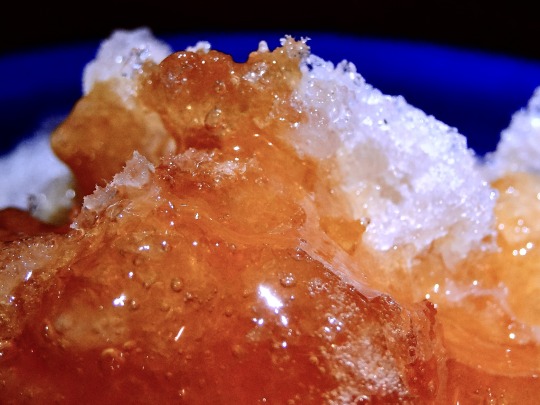
[ID: An extreme close-up on snow crystals topped with syrup in bright white and various shades of orange; bubbles are trapped throughout the syrup. End ID]
Viticulture Under Occupation
Today, the tending and harvesting of grapes in Al-Khalil take place under the shadow of Israeli settlements. Israel encourages the transfer of settler populations to settlements in Al-Khalil—including particularly fervent Israeli nationalist cells in the middle of Palestinian areas—with financial incentives and the creation of infrastructure that only settlers can move through freely. Palestinians are forbidden to drive in the "H2" area of Al-Khalil, which encompasses the central Old City and the الحرم الإبراهيمي ("Al-Ḥaram al-Ibrāhīmī"; Sanctuary of Abraham), and has been under Israeli military control since 1997. Israel conducts regular raids in the nominally Palestinian "H1" area, forcing people to leave their homes, destroying property, and committing arbitrary arrests and imprisonments.
The rapid expansion of settlements in the areas around Al-Khalil, such as those in what Israel calls גּוּשׁ עֶצְיוֹן (“Gush Etzion”; Etzion Bloc) and גִּבְעַת חַרְסִינָה ("Givat Harsina"), pushes Palestinians into ever-smaller and denser areas surrounded by settlements, rendering them still more vulnerable to Israeli control.
Alessandro Petti describes the strategy by which Israel fragments and isolates Palestinian areas, while allowing flow of movement between territories for non-Palestinians, as a distinction between free-flowing settler "archipelagoes" and Palestinian "enclaves." Infrastructure such as patrols, roadblocks, barriers, curfews, strip-searches and thorough searches of luggage—to which only Palestinians are subjected—make travel a time-consuming, nerve-wracking, and uncertain process: one that may end with being denied a permit, turned back from a border, or jailed for driving on a road which turns out to be prohibited to Palestinians. Because the rules are constantly changing, Palestinians may continue to avoid a road that is no longer actively barricaded out of fear that attempting to traverse it will lead to arrest.
Official Israeli military policy and settler violence alike cast a pall on Palestinian agricultural tradition and innovation. Farming and shepherding communities in the southern hills of Al-Khalil have been subjected to harassment, home demolition, and forced displacement at the hands of settlers and military bulldozers. Settlers burn grape and olive orchards and cut down mature grape vines. Palestinians are no longer allowed to access ancestral agricultural land that has been overtaken by colonists. Israeli military orders and settler harassment emptied Al Khalil's Old Souq of its vegetable and fruit markets in 2000; in 2019, plans were made to raze Palestinian shops and build a new settlement atop them. These plans would move forward in July of 2023.
Reprisal and collective punishment in the wake of militants' October 7th attacks on settlers have been felt in the West Bank and also impact agriculture in Al-Khalil. Grapes rot on the vine with farmers forbidden to tend them. Streets have been closed, shutting Palestinian farmers into their homes, while Palestinian shepherds in villages in the Al-Khalil area have been displaced and harassed with drones. Settler attacks and destruction of crops, already on a continual uptick for the previous several years, increased to a new high in 2023.
Olives, Grapes, and Resistance
Agriculture has been an important site of Palestinian resistance to settler incursion as, despite harassment, surveillence, and violence, Palestinians insist on staying on their land and in their homes. The Palestinian minority who inhabit the H2 area of Hebron, continuing to tend their olive trees, prevent the area from becoming settler-only and keep alive the hope that Al-Khalil will not become a "ghost town."
Various projects based in Al-Khalil combat settler technologies and strategies. Farmers in Al-Khalil launched the Cooperative Society for Agricultural Marketing and Processing in 1984 to increase grape farmers' self-sufficiency, reduce produce waste, and contribute to the production of Palestinian grape delicacies. The 2022 Counter Surveillance project, launched by Palestinian activist Issa Amro and artist Adam Broomberg, meets the Israeli security cameras stationed among Al-Khalil's olive groves with its own video feed, livestreamed online and to art museums.
Palestine's annual grape festival at حلحول ("Ḥalḥūl"), just north of Al-Khalil, took place in 2023 as scheduled; farmers displayed boxes of grapes of all colors and varieties, and sold dibs, malban, raisins, and jam. And Palestinian farmers and activists contribute to resurgences of indigenous seed varieties—such as the دابوقي ("dābūqi") grape, historically particularly prominent in Al-Khalil—in an effort to preserve Palestine's biodiversity and economic self-sufficiency.
Buy seeds from the Palestinian Heirloom Seed Library
Help Palestinian families evacuate Gaza
Contribute to an eSIM donation drive
Ingredients:
For the syrup (makes 2/3 cup):
2.5kg (5.5lb) tart green grapes, stems removed
For the base:
A large bowl of fresh snow
If it doesn't snow where you live, you can try making shaved ice using a snowcone machine; putting water in an ice-cream maker until you achieve a slushy texture; or running ice cubes through a blender.
Instructions:
For the syrup:
1. Remove grapes from their stems and rinse.
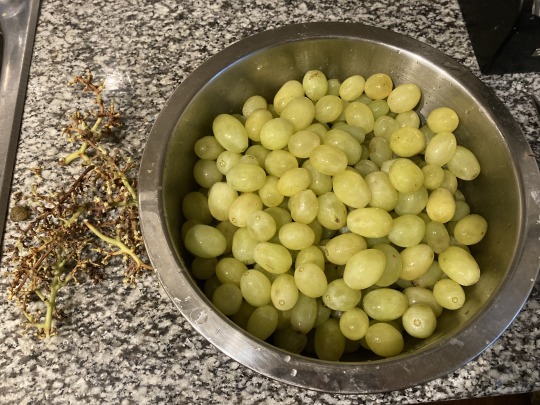
2. In a large bowl, mash and muddle grapes with your hands or a potato or bean masher; or pass grapes through a blender, food mill, or juicer.
3. Strain mashed grapes through a metal strainer, and then a cheesecloth (if you used a juicer, skip right to the cheesecloth). I had 4 cups (1 litre) of grape juice at this point.
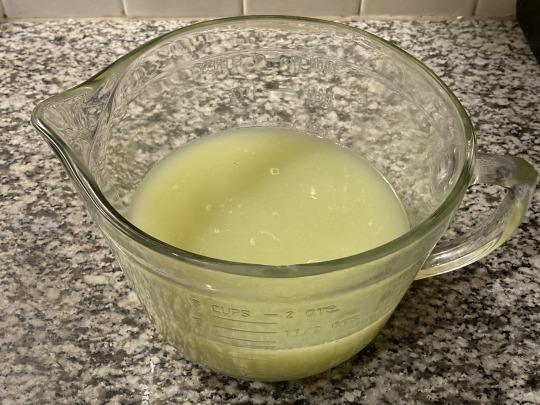
4. Pour grape juice into a thick-bottomed pot with a large diameter, preferably one with a light-colored bottom. Heat on medium to bring to a boil.
5. Continue simmering juice, skimming scum off the surface as it arises. Occasionally wipe down the edges of the pot with a wet pastry brush to prevent sugar from sticking and burning.
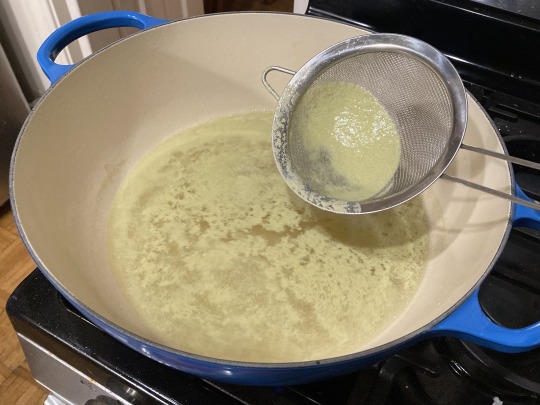
6. Eventually scum will stop rising. Continue to simmer until several shades darker in color and bubbling vigorously. Syrup should still pour freely, and just barely coat the back of a spoon. I had just over 2/3 cup (160 mL) at this point.

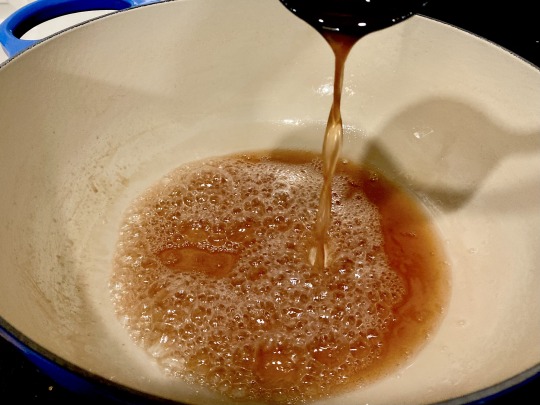
7. Remove from heat and allow to cool slightly before pouring into a jar. Allow to cool to room temperature before refrigerating. If you want to keep the syrup for multiple months or at room temperature, use a sterilized jar.
Compost the grape peels, or reserve to make fruit scrap vinegar.
For the dish:
1. Set a large bowl out several hours into a heavy snowfall; or collect just the top layer of freshly fallen snow after it has been snowing for several hours. Snow that falls earlier in a snowfall, or that has been sitting out for a longer period of time, is more likely to contain pollutants.
2. Compact the snow with a spoon to make the texture homogenous. Some people run it through a blender. Fill individual serving bowls with snow.
3. Pour cooled molasses to taste onto the snow and mix.
252 notes
·
View notes
Text
From the Ashes: Marvel Infinity #14
Continuing on from last week…

The comic starts with the following narration:
"Sometimes, you get a moment..."
We then see Max as a child with his father, Jakob.

The narration continues: "...when everything lines up... ...when anything is possible."
We now see Max facing a firing squad who has opened fire with Jakob's hand on his shoulder.
"When suddenly, you can make things happen."
We then see Max as child with bullets in midair.
"But other times.. Perhaps most of the time...
...you can't."
We then see blood and broken glass on the snow. We're back from where issue #13 left off and Max is waking up after being hit by a car.

Someone is calling to him off panel, "Mr. Eisenhardt..." Turns out, he's being roused by Rabbi Sagan and a bystander.

According to Google Translate, Max is saying "I... yes, Dad takes us across the Vistula. There's a famer in Radom who will hide us."
Cut off in the picture is the wreckage of the car in flames.


What might not be clear in the art is that Max is dragging his lower body to get to the car.
Narration continues: "A few months ago, Magneto could have made something happen."
"A few months ago, he could have dismantled the ruined car and spirited the child away to safety with a thought."
We now see a horrific scene of Anna in the fiery car screaming, "Somebody help us! Poppa won't wake up!"
Narration: "But now he is helpless"
Max is reaching into the car to get to her with the Rabbi reaching out behind him but Max is immediately burned.
Narration: "As helpless as he was when the jaws of the twentieth century closed on his people."
"Now, as then, he is condemned to simply bear witness."

Anna is grasping at her seatbelt, "I'm... I'm stuck!"
Max, face illuminated by the fire, is calling out to her "Then... then you must cut yourself loose! Is there anything to hand, a... a tool... something sharp?! Anything!"

Anna cuts through the seatbelt and begins clinging to her dad in the driver's seat, "I'm free! We can go now, Daddy!"
Max shouts back, "No! You have to leave him! He would want you to."
"Look! There are people here to help your father, but you have to climb!"
Anna is hesitant, "I... I..."
"DO IT!" Max shouts.
Anna starts climbing over her father as the firefighters are getting into position to hose off the car, "Daddy, I'm sorry! It's... it's too hot!"

"I've got you." - Max
Max is being attended to by a medical professional. They're wrapping up his burnt arm. Someone off panel says, "It smells like reindeer sausage in here."

Rabbi Sagan confirms that Anna is safe and well. "The father too. Concussion. Smoke inhalation, but he'll be fine."

Rabbi Sagan sits with Max. "... Did I tell you how my grandmother Coralie came to live here in Alaska?"
Max: "I can guess..."
Rabbi Sagan: "When she was just three years old, she was a detainee at Furs internment camp in France."
(as Rabbi Sagan speaks, we see scenes of grandmother Coralie's life illustrated)
"And she would have surely died there had Andree Salomon not rescued her and put her on a train bound for Lisbon, where the S.S. Mouzinho was waiting to take her to America.
She arrived in New York on June 21st, 1941, where she was placed with a foster family who moved to Anchorage soon afterwards.
On Purim, she'd always get maudlin drunk and tell us about her mother -- her desperate, hopeful smile as she entrusted her only daughter to a stranger and the sea.
She knew she wouldn't live to see her daughter thrive across the ocean.
She sent her anyway."

"With the coming of Moshiach and the resurrection of the righteous" the Rabbi responds. "But I think you already had one of those covered."
Back to X-Men HQ, AKA "The Factory." Later.

"Summers and the others are heading out on another mission. You should get some rest." Max says to Hank.

Hank: "Max... Respectfully.... ...You won't."
Max: "Henry, trust me..."

The end? Infinity comics will be focusing on the Alaska team for the next 2 issues so maybe we'll see more on this.
#magneto#max eisenhardt#x men#marvel#erik lehnsherr#x-men#infinity comics#beast#hank mccoy#x comics#x-comics
44 notes
·
View notes
Text
How a Kabbalist Accidentally Became an Arsonist: A True Tale of the Rabbi who Burned Down the Jewish Ghetto of Frankfurt in 1711 🔥🧵

By 1704, when he was invited to become Chief Rabbi of Frankfurt, Rabbi Naphtali Katz had gained renown throughout Ashkenaz as a Ba'al Shem—a shamanic healer, amulet writer, and kabbalist.

His tenure in Frankfurt was brief. It ended on Jan. 14th, 1711, when a fire spread from his home & reduced the Judengasse—then the largest Jewish community in Germany—to ashes.

He was arrested by German authorities on claims of arson & witchcraft and was held for five months before being exiled from Frankfurt.
Soon after the fire, this poster was hung by Christians throughout the Judengasse. The left side depicts the Jews fleeing the flames.

The right side reads (in part): "Alas! The happiest [and] most unhappy day On which at Frankfurt am Main The Jewish quarter having been set ablaze With Rabbi Naphtali the Pole being the cause Within the space of 24 hours burned to the foundations."
How exactly did Rabbi Naphtali cause this urban wildfire? Johann Jacob Schudt, in his "Jewish Oddities"(1714, Frankfurt) records several rumors. One popular account blamed his kabbalistic malpractice...

"The Rabbi, who was a great kabbalist, had himself set the fire to show his students how he could extinguish the fire...(but) in his haste to put it out he had summoned the Prince of Fire instead of the Prince of Water & that is why the fire grew." Oops!
This is a painting made by the German Jewish artist Johann Nothnagel entitled, "Rabbi Naphtali Cohen with two Schoolchildren" (1772). It portrays this scene of angelic conjuring & accidental arson.

The Magen David image before him was part of a popular kabbalistic recipe for extinguishing fires. The radiant and hovering disk = the angelic Prince of Fire. Smoke emerges from the top right & the student's faces flash concern.
Nothnagel made a copy of this painting a few years later with one significant change: The abstract disk is replaced with a more concrete angelic figure.

Notice how this version has been modeled after another scene of angelic conjuring: Rembradnt's "Faust" (1652).

In a sort of full-circle, Rembrandt was likely modeling his portrait on tropes of Kabbalah popular during his time.

Who is the Prince of Fire (Sa'ar Ha-Esh)? Midrashic sources identify him with the archangel Gabriel. "Michael is the angel of snow and Gabriel of fire; this one does not extinguish that one, and that one does not harm this one." (Shir Ha-Shirim Rabbah 3:11)
Sefer Ha-Razim, a magic text from the time of the Midrash, identifies two other angelic fire-archons: "Yabniel is in charge of all things concerning the igniting & extinguishing of fire... Deleqiel is in charge of flames of fire, to kindle or quench them."

Rashi (1040-1105) already reports that summoning these angels was uniquely difficult.

Interestingly, a very similar story to Rabbi Naphtali's arson is told about another Ashkenazi Ba'al Shem—The Ba'al Shem Tov/Besht. This version is from "In Praise of the Besht" (Kopust, 1814).

A second version of this story is told by a later hassidic master.

This incident would have occurred not long after 1711 (the Besht is born in 1698 & these tales occur in his youth). And, reportedly, the Besht knew of Rabbi Naphtali & mocked his ascetic model of practical Kabbalah.

The upshot? Don't start a fire to prove you can put it out + When Kabbalah is no longer theoretical but also "practical," its relationship to the elements and society is more acute & mistakes have material & historical consequences.
29 notes
·
View notes
Text
Welcome to Revenge of the Underrated!
Some of you asked me to put a "haven't watched both" to be more fair to the more unknown movies, but I've seen other tournaments doing this and I think it limits too much who can participate in the polls. So what I decided to do is a double elimination!
What does that mean? That means a movie has to lose twice to be eliminated. In other words, there will be a sorts of losers bracket that'll be part of main bracket. I'm undecided on whether to do this for only one round or the whole bracket, as it would make the tournament very long. Do let me know if you have any opinion about it.
Anyway, Revenge of the Underrated, Round 1:
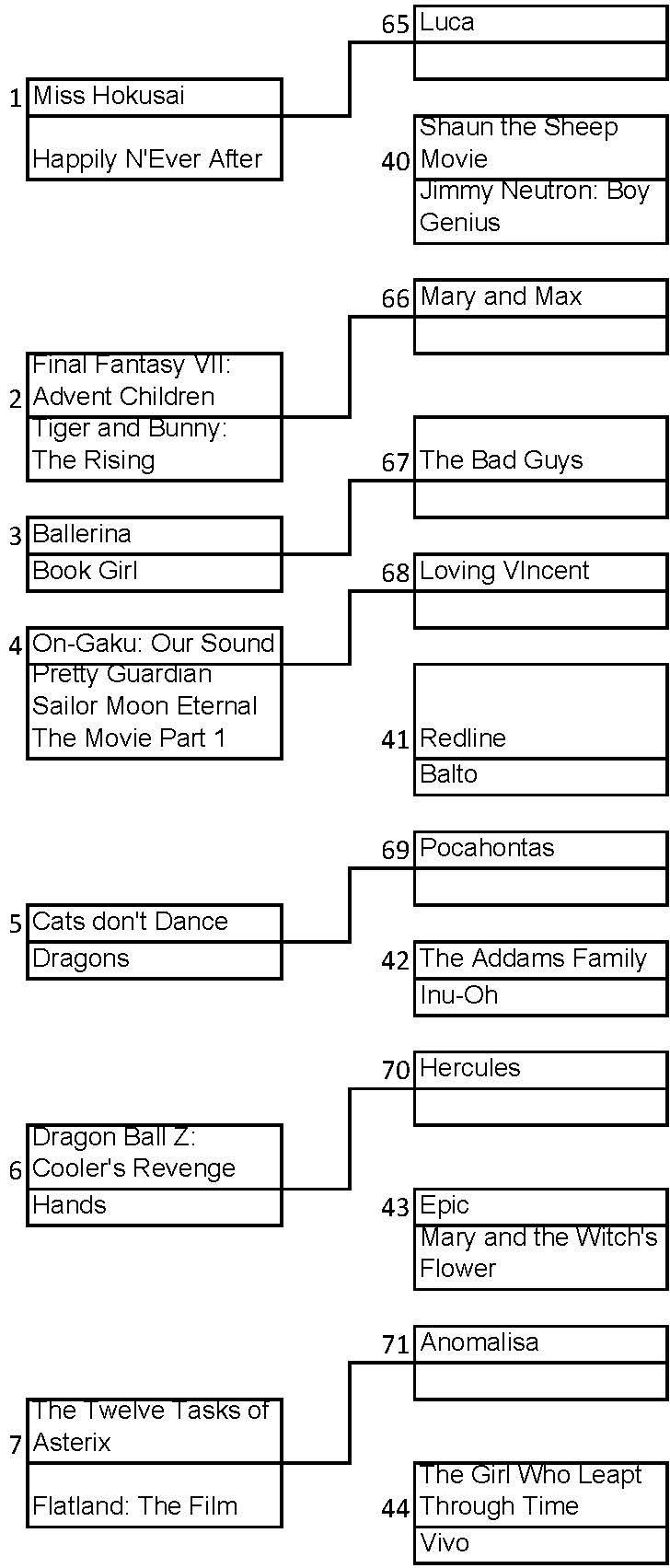
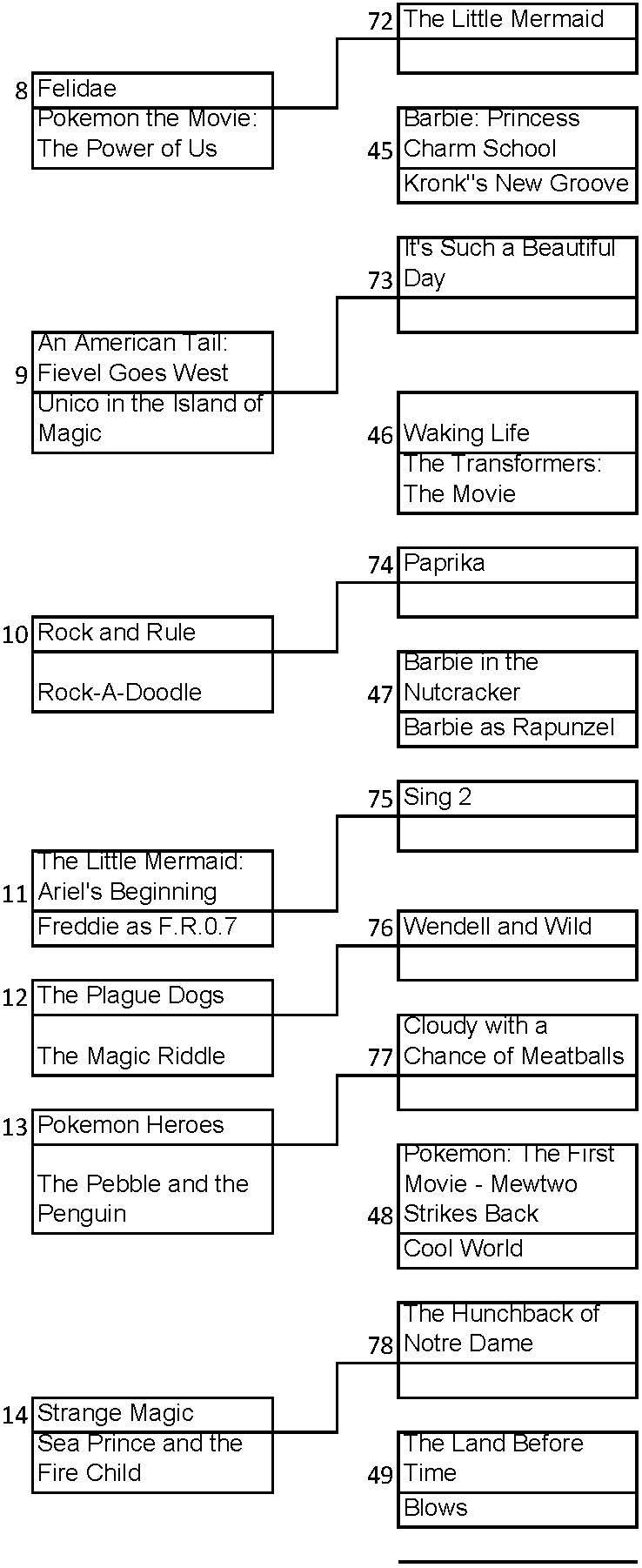
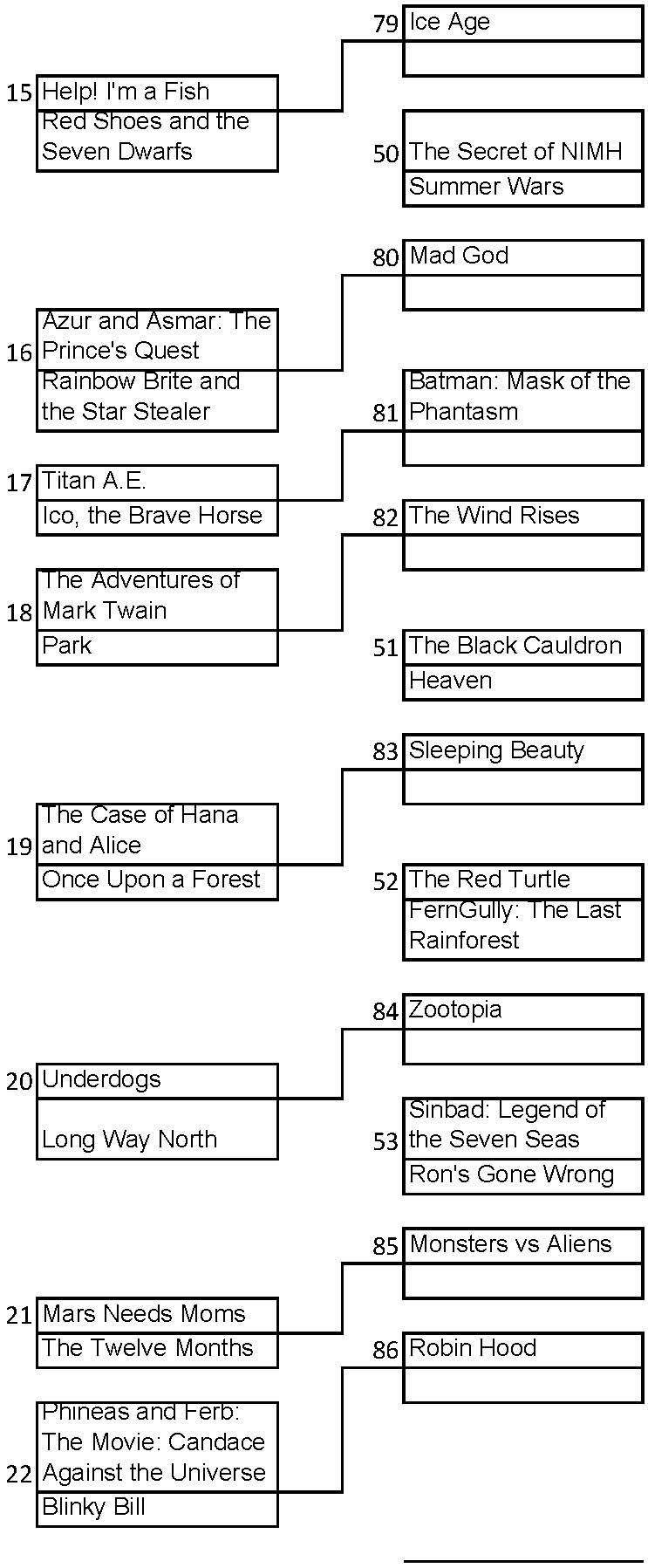
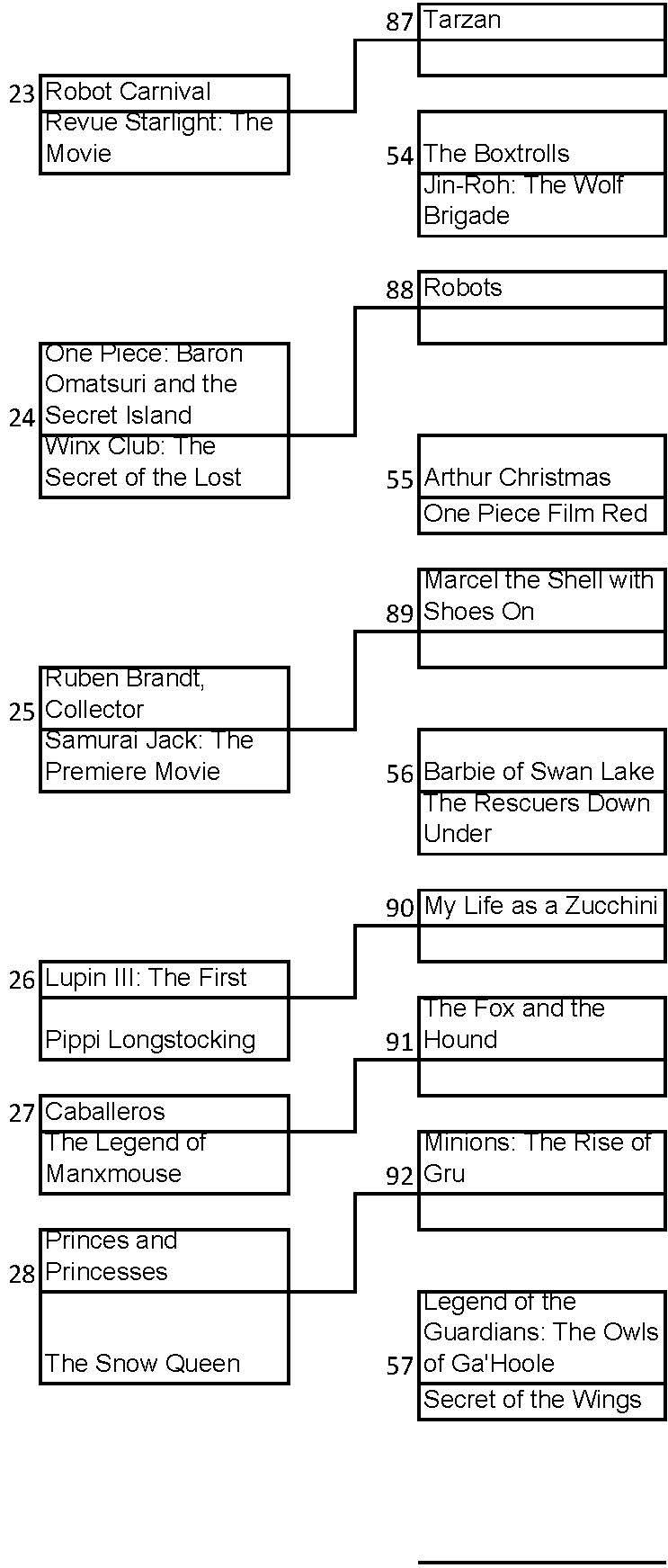
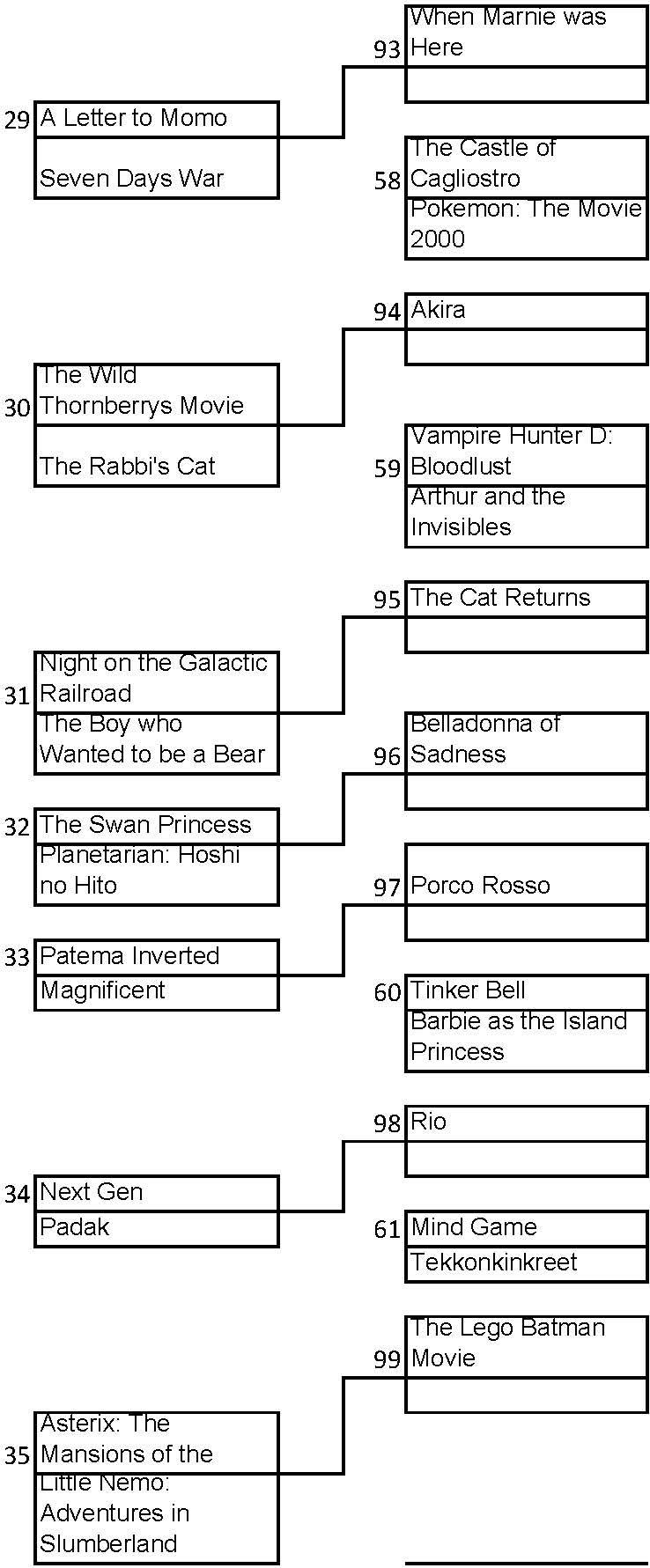

Miss Hokusai vs Happily N'Ever After
Final Fantasy VII: Advent Children vs Tiger and Bunny: The Rising
Ballerina vs Book Girl
On-Gaku: Our Sound vs Pretty Guardian Sailor Moon Eternal The Movie Part 1
Cats don't Dance vs The Flight of Dragons
Dragon Ball Z: Cooler's Revenge vs The Girl Without Hands
The Twelve Tasks of Asterix vs Flatland: The Film
Felidae vs Pokemon the Movie: The Power of Us
An American Tail: Fievel Goes West vs Unico in the Island of Magic
Rock and Rule vs Rock-A-Doodle
The Little Mermaid: Ariel's Beginning vs Freddie as F.R.0.7
The Plague Dogs vs The Magic Riddle
Pokemon Heroes vs The Pebble and the Penguin
Strange Magic vs Sea Prince and the Fire Child
Help! I'm a Fish vs Red Shoes and the Seven Dwarfs
16.Azur and Asmar: The Prince's Quest vs Rainbow Brite and the Star Stealer
17.Titan A.E. vs Ico, the Brave Horse
18.The Adventures of Mark Twain vs A Troll in Central Park
19.The Case of Hana and Alice vs Once Upon a Forest
20.Underdogs vs Long Way North
21.Mars Needs Moms vs The Twelve Months
22.Phineas and Ferb: The Movie: Candace Against the Universe vs Blinky Bill
23.Robot Carnival vs Revue Starlight: The Movie
24.One Piece: Baron Omatsuri and the Secret Island vs Winx Club: The Secret of the Lost Kingdom
25.Ruben Brandt, Collector vs Samurai Jack: The Premiere Movie
26.Lupin III: The First vs Pippi Longstocking
27.The Three Caballeros vs The Legend of Manxmouse
28.Princes and Princesses vs The Snow Queen
29.A Letter to Momo vs Seven Days War
30.The Wild Thornberrys Movie vs The Rabbi's Cat
31.Night on the Galactic Railroad vs The Boy who Wanted to be a Bear
32.The Swan Princess vs Planetarian: Hoshi no Hito
33.Patema Inverted vs Bartok the Magnificent
34.Next Gen vs Padak
35.Asterix: The Mansions of the Gods vs Little Nemo: Adventures in Slumberland
36.Thumbelina vs Catnapped!
37.Early Man vs Rainbow Magic: Return to Rainspell Island
38.Junk Head vs Hey Arnold! The Jungle Movie
39.Charlotte's Web (1973) vs The Princess and the Goblin
40.Shaun the Sheep Movie vs Jimmy Neutron: Boy Genius
41. Redline vs Balto
42. The Addams Family vs Inu-Oh
43. Epic vs Mary and the Witch's Flower
44.The Girl Who Leapt Through Time vs Vivo
45.Barbie: Princess Charm School vs Kronk''s New Groove
46.Waking Life vs The Transformers: The Movie
47.Barbie in the Nutcracker vs Barbie as Rapunzel
48.Pokemon: The First Movie - Mewtwo Strikes Back vs Cool World
49.The Land Before Time vs When the Wind Blows
50.The Secret of NIMH vs Summer Wars
51.The Black Cauldron vs All Dogs go to Heaven
52.The Red Turtle vs FernGully: The Last Rainforest
53.Sinbad: Legend of the Seven Seas vs Ron's Gone Wrong
54.The Boxtrolls vs Jin-Roh: The Wolf Brigade
55.Arthur Christmas vs One Piece Film Red
56.Barbie of Swan Lake vs The Rescuers Down Under
57.Legend of the Guardians: The Owls of Ga'Hoole vs Secret of the Wings
58.The Castle of Cagliostro vs Pokemon: The Movie 2000
59.Vampire Hunter D: Bloodlust vs Arthur and the Invisibles
60.Tinker Bell vs Barbie as the Island Princess
61.Mind Game vs Tekkonkinkreet
62.The Many Adventures of Winnie the Pooh vs Dragon Ball Super: Broly
63.Mirai vs Dragon Ball Super: Super Hero
64.The Lion King II: Simba's Pride vs Scooby-Doo! and the Cyber Chase
27 notes
·
View notes
Text
these our vows of flesh
Spinning Silver, Miryem/the Staryk, M, 4.8k. A wedding night, and promises.
It was not the wedding my parents had dreamed I would have, of that much I was certain. I suspected that few parents dreamed that their daughter would one day marry the king of a people who had long preyed upon theirs.
But it was a wedding of my people: We had our chuppah, built by my father and Sergey, draped in silver silk and strewn with white blossoms that the Staryk had brought from the newly blooming grove; we had the rabbi my grandfather had brought from Vysnia and paid handsomely for his discretion, though likely he would not remember me or the Staryk by the time his sleigh slipped through the gates of Vysnia; we had the glass crushed beneath the Staryk’s foot to cries of “Mazel tov!”; and we had all the dances of a Jewish wedding, though only I, my parents, my grandfather, and the rabbi knew them. Wanda, Sergey, and Stepon danced gamely along, as did Flek and Tsop and Shofer and all of the other accompanying Staryk.
The sky shone clear and pale above—for the Staryk had held back the snows for our wedding—as we danced in the open space between Stepon’s mother’s tree and the forest that drew its snow-clad arms about my family’s house. I danced in the ring of women, Wanda’s hand in my left hand and Flek’s in my right, and counted all the things I had gained—my mother, hale and red-cheeked at last, smiling beneath her crown of white flowers; a sister and brothers to fill the space I would leave when I followed my Staryk to his kingdom tonight; a husband and a people to love; and more friends than I had ever thought I might have.
Open-Handed the Staryk had named me, and yet I could not fathom all that had come into my hands, a greater wealth than any amount of silver I might spin into gold.
Read the rest on AO3.
5 notes
·
View notes
Text
Excerpt from an interview with Ted Kaczynski (aka Unabomber) in which he recounts his day to day life in the forest:
BVD (the interviewer): What was an average day like for you in Lincoln?
TJK (Ted Kaczynski): That’s a very difficult question to answer because I don’t know that there was an average day. My activities varied so much according to the season and according to the tasks I had before me on a given day. But I will describe a representative day…
TJK: …Well, let’s take a day in January, and let’s suppose I wake up about 3:00 a.m. to find that snow is falling. I start a fire in my stove and put a pot of water on. When the water comes to a boil I dump a certain quantity of rolled oats into it and stir them for a few minutes until they are cooked. Then I take the pot off the stove, add a couple of spoonfuls of sugar and some milk—made from powdered milk.
While the oats are cooling I eat a piece of cold boiled rabbit meat.
Afterward I eat the oats. I sit for a few minutes before the open door of the stove watching the fire burn down, then I take my clothes off again, get back into bed, and go to sleep. When I wake up, the sky is just starting to get light. I get out of bed and dress myself quickly because it’s cold in the cabin. By the time I’m dressed there’s a little more light and I can see that it’s no longer snowing and the sky is clear. Because of the fresh snow it should be a good day for rabbit hunting. So I take my old, beat-up, single-shot 22 down from the hooks on the wall. I put my little wooden cartridge-box, containing 16 cartridges, in my pocket, with a couple of books of matches wrapped in plastic bags and a sheath knife on my belt in case I have to build a fire in an emergency. Then I put on my snowshoes and take off. First there’s a hard climb to get up on top of the ridge, and then a level walk of a mile or so to get to the open forest of lodgepole pines where I want to hunt. A little way into the pines I find the tracks of a snowshoe hare. I follow the trail around and around through its tangled meanderings for about an hour. Then suddenly I see the black eye and the black-tipped ears of an otherwise white snowshoe hare. It’s usually the eye and the black-tipped ears you notice first. The bunny is watching me from behind the tangled branches and green needles of a recently-fallen pine tree. The rabbis is about 40 feet away, but it’s alert and watching me, so I won’t try to get closer. However, I have to maneuver for an angle to shoot from, so that I can have a clear shot through the tangle of branches—even a slender twig can deflect a .22 bullet enough to cause a miss. To get that clear shot I have to lie down in the snow in an odd position and use my knee as a rest for the rifle barrel. I line up the sights on the rabbit’s head, at a point just behind the eye…hold steady…ping! The rabbit is clipped through the head.
Such a shot ordinarily kills the rabbit instantly, but the animal’s hind legs usually kick violently for a few seconds so that it bounces around in the snow. When the rabbit stops kicking I walk up to it and see that it’s quite dead. I say aloud “Thank you, Grandfather Rabbit”– Grandfather Rabbit is a kind of demigod I’ve invented who is the tutelary spirit of all the snowshoe rabbits. I stand for a few minutes looking around at the pure-white snow and the sunlight filtering through the pine trees. I take in the silence and the solitude. It’s good to be here. Occasionally I’ve found snowmobile tracks along the crest of the main ridge, but in these woods where I am now, once the big-game hunting season is over, in all my years in this country I’ve never seen a human footprint other than my own. I take one of the noosed cords out of my pocket. For convenience in carrying I put the noose around the rabbit’s neck and wrap the other end of the cord around my mittened hand. Then I go looking for the trail of another rabbit.
When I have three rabbits I head home. On arriving there I’ve been out some six or seven hours. My first task is to peel off the skins of the rabbits and remove their guts. Their livers, hearts, kidneys, brains, and some assorted scraps I put in a tin can. I hang the carcasses up under the shelter, then run down to my root cellar to fetch some potatoes and a couple of parsnips. When these have been washed and other chores performed—splitting some wood maybe, or collecting snow to melt for drinking water—I put the pot on the boil, and at the appropriate time add some dried wild greens, the parsnips, the potatoes, and the livers and other internal organs of the rabbits. By the time it’s all cooked, the sky is getting dark. I eat my stew by the light of my kerosene lamp. Or, if I want to economize, maybe I open the door of the stove and eat by the light of the fire. I finish off with a half a handful of raisins. I’m tired but at peace. I sit for a while in front of the open door of the stove gazing at the fire. I may read a little. More likely I’ll just lie on my bed for a time watching the firelight flicker on the walls. When I get sleepy I take off my clothes, get under the blankets, and go to sleep.
BVD: I envy you, too … While work, that does sound wonderful.
Freedom and autonomy. No time clock to punch, whether literal or figurative. But let me shift topic. You just mentioned sleep. Was your bed, or bunk, comfortable?
TJK: Well, it was comfortable enough for me.
#unabomber#nature#diy#preparation#alternative#handcrafted#resources#forest#anarchism#night in the woods#woods
56 notes
·
View notes
Note
for the fake fic ask game:
a THG fic with: accidental marriage, political intrigue and mutual pining!
OOF this is so hard i’ve been thinking about this one for a WHILE but i think i got it!! in honor of Passover…a Jewish!Everlark (shtetl!District 12, really) AU set during Catching Fire.
The twin burns on their hands aren’t the only things binding Katniss and Peeta together that fateful night before the Passover Seder. When they tear the loaf to drop in the Mellark fireplace together, cleansing the house of chametz before the holiday, they’re transported to another time with another burnt loaf…until they look down to find a toasted piece of bread in each of their hands. And, worse yet, Mrs. Mellark saw the whole thing. Couldn’t they at least have waited to do the toasting under a chuppah? Oy, what a shanda!
As Katniss and Peeta are marched down to the Justice Building by Mrs. Mellark and the town rabbi, Katniss fears the repercussions from President Snow, whose perfect, goyische Capitol wedding was just ruined by the accidental fulfillment of the District 12 tradition.
A month after Peeta stepped on the glass in the Justice Building, making their marriage legal in the eyes of both the state and HaShem, they learn the consequences of their actions when President Snow announces the Quell. With nothing left to lose, Katniss and Peeta start to think that maybe the meshugas they caused could be what saves them in the arena. After all, being star-crossed lovers worked pretty well last time.
In the battle for their culture, their rights, their traditions, and their lives, they can’t help but wonder…is it beshert?
glossary for the goyim:
shtetl - small Jewish towns in Eastern Europe (generally pre WWII for obvious reasons)
Passover - holiday where we don’t eat leavened bread and we often burn it to ensure our houses are entirely bread-free before the holiday
Seder - super long ritual dinner we do on the first night or two of passover
chametz - leavened bread
chuppah - a big ritual tarp we get married under
shanda - scandal
rabbi - Jewish spiritual leader (comparable to a minister or imam)
goyische - goy-like (“goy” means non-Jew; serves a similar role to gringo/a in Spanish-speaking regions)
breaking the glass - wedding tradition where the groom steps on a piece of glass which usually ends the ceremony
HaShem - literally translates to “the name” but is just God (we’re not allowed to say God’s name)
meshugas - ridiculousness, chaos
beshert - basically destiny (“it would’ve happened anyway…”)
#the hunger games#thg#katniss everdeen#peeta mellark#everlark#judaism#jewish#jewish!peeta#jewish!katniss#passover#chag sameach#fake fic ask game#ask game#asks#asks answered#jewish!everlark#retiredficwriter
9 notes
·
View notes
Text
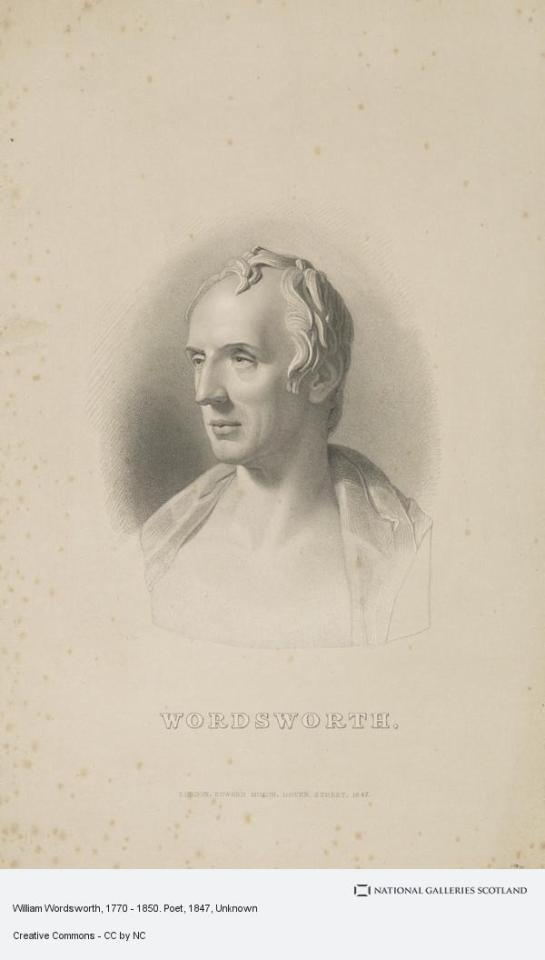

The English poet William Wordsworth was born on April 7th 1770.
While he may be remembered as a quintessential English bard he did have his good points and holidayed in Scotland. His sister Dorothy wrote Recollections of a Tour Made in Scotland, A. D. 1803 about their six-week, 663-mile journey through the Scottish Highlands. Some have called it "undoubtedly her masterpiece" and one of the best Scottish travel literature accounts during a period in the late 18th and early 19th centuries which saw hundreds of such examples. It is often compared as the Romantic counterpart to the better-known Enlightenment-era travel memoirs of Samuel Johnson with his friend James Boswell.
Anyway back to the birthday boy! Here is a poem he wrote while touring our country.....
Memorials Of A Tour In Scotland.
Too frail to keep the lofty vow
That must have followed when his brow
Was wreathed--'The Vision' tells us how--
With holly spray,
He faltered, drifted to and fro,
And passed away.
Well might such thoughts, dear Sister, throng
Our minds when, lingering all too long,
Over the grave of Burns we hung
In social grief--
Indulged as if it were a wrong
To seek relief.
But, leaving each unquiet theme
Where gentlest judgments may misdeem,
And prompt to welcome every gleam
Of good and fair,
Let us beside this limpid Stream
Breathe hopeful air.
Enough of sorrow, wreck, and blight;
Think rather of those moments bright
When to the consciousness of right
His course was true,
When Wisdom prospered in his sight
And virtue grew.
Yes, freely let our hearts expand,
Freely as in youth's season bland,
When side by side, his Book in hand,
We wont to stray,
Our pleasure varying at command
Of each sweet Lay.
How oft inspired must he have trod
These pathways, yon far-stretching road!
There lurks his home; in that Abode,
With mirth elate,
Or in his nobly-pensive mood,
The Rustic sate.
Proud thoughts that Image overawes,
Before it humbly let us pause,
And ask of Nature, from what cause
And by what rules
She trained her Burns to win applause
That shames the Schools.
Through busiest street and loneliest glen
Are felt the flashes of his pen;
He rules 'mid winter snows, and when
Bees fill their hives;
Deep in the general heart of men
His power survives.
What need of fields in some far clime
Where Heroes, Sages, Bards sublime,
And all that fetched the flowing rhyme
From genuine springs,
Shall dwell together till old Time
Folds up his wings?
Sweet Mercy! to the gates of Heaven
This Minstrel lead, his sins forgiven;
The rueful conflict, the heart riven
With vain endeavour,
And memory of Earth's bitter leaven,
Effaced for ever.
But why to Him confine the prayer,
When kindred thoughts and yearnings bear
On the frail heart the purest share
With all that live?--
The best of what we do and are,
Just God, forgive!
Pics are the man himself and a quote he made about the Scottish Bard, Rabbie Burns.
9 notes
·
View notes
Text
if the winter nights implore you
to go write another book
to find reasons for existence
and to fall sink, line, and hook
if the snow’s glow under moonlight
gives you chills by light of day
and the church bells seem to haunt you
find a synagogue to pray
when my father was a boy
he asked his rabbi about god
that was the day he stopped believing
what his saturday school taught
faith is fickle in those hurting
and is vicious in the cruel
I grew up believing
believing nothing
except in my love for you
#song lyrics#songwriter#it helps to remember#it still snows after december#indie music#poetry#original poem#aesthetic#artists on tumblr#winter#judaism#religious trauma#Spotify
3 notes
·
View notes
Text

Bunny Mint as Snow Rabby world variant edits
30 notes
·
View notes
Text
And Lilith Sewed the Seam - Sapphic Short Story
The frost came early that year, the year the Queen of Night came to Karelia. We lived in Sharon, a little shtetl in Grand Russe on the Finnish border that was known for its beautiful alpine aerials and lakes like beads of blue glass. The ocean, too, was refreshing to swim in – provided one went to the banya afterwards. I was a young lass in the rime-laden harbors and forests. We Jews of Sharon were a sailing, seabound lot, making our living off fishing and the waves. But mama, bubbe and I? We were seamstresses of the finest caliber. Some would say we were magick. They called us, and our shop, The Weaving Wives.
The boyars ordered traditional kaftans straight from bubbe’s shop, woven with the earth goddess Mokosh and her lovers Veles and Perun on the breast. I had grown up toeing the line between two faiths. I learned both the myths of Baba Yaga eating unworthy children and the Night Howler Agrath screech-dancing on the roof to mark a house that her husband, Sammael, would strike down as dogs bayed at his twelve-winged flight. Sometimes, late at night, I could hear them.
Or perhaps it was only a storm…
Word of bubbe’s and mama’s and my craftiness spread. The year I turned sixteen, the tsarina herself ordered a fashionable cape from us. It was based off the tale of Father Frost’s granddaughter, Snegurochka the Snow Maiden. A tale I had always loved. It was the first project over which I was given complete ownership.
I embroidered white, pale pink and dove gray pearls on the powder blue cape in little clusters of wings shaped like snowflakes, then stitched eiderdown into the golden seams. Bubbe dusted it with malachite flakes to bless it from far off Azov, the riches of the earth piling high upon the tsarina’s head.
Mama, bubbe, and I were the treasures of Sharon. We were married to our thread, the men and women of Sharon said, and they—from the hunters to the midwives to the rabbi, to my own father, a ship captain and whaler—guarded our secrets with their very lives.
We Weaving Wives were a protected, cherished lot. And our craft was our very soul. There was a deep magick in that sewing. For in truth, we were good witches. We could summon sunlight to make yellow fabric like a peach. Melt down rusalka hair in our oven to create the finest threads. Our secrets were the stuff of legends, and we were glad not to tell the rabbi about them, or even dear papa. And the menfolk knew better than to ask, but the women always wondered.
The cape was the talk of the kingdom.
No wonder, the tsarina was pleased.
As fame of our clothing grew, the Weaving Wives gained esteem. Through charitable works we lifted our community up and filled the synagogue coffers to the brim. Our family did good works in Adonai’s name. All so that Peniel – the Face of God – might shine down after the three of us wrestled long with a hill of fabric, like female Jacobs and a needle-bound angel.
But the frost came early the year I turned eighteen, and it stole my bubbe away. Crying tears like glass beads, I looked into my mirror after shiva was over and found myself a changed maid: my long black curls were winsome, I was plump and rounded to please men, and my cornflower eyes could break hearts. I needed a husband. Only… the village maidens had always been far more winsome.
Fair Shayna, with eyes like silver coins. Comely dark Miriam, with a heart like a thorny rose. And Delilah, the marigold of my garden. I had tossed and turned with all of them in the fields and furrows on Ivan Kupalo, what the Western countries called St. John’s Eve, as we searched for fern flowers together to promise bonds of eternal love. Shayna’s lips were soft. Miriam’s grip on my hot hips was hard, determined, just like Malakh HaMavet striking only holy blows.
But Delilah? She was mother-of-pearl dissolving in Cleopatra’s wine. A beauty wrapped in a carpet, delivered to Marc Antony.
I wanted Delilah more than life itself. But Shayna and Miriam had already taken husbands. We were eighteen, after all. Only Delilah, with her red hair, pale skin, full form, and freckles, was left, and to me, she was more holy than any synagogue, a word on the tongue of G-d that would make Chava take an apple all over again, but this time, a blessed fruit. Delilah was a pearl of great price that could redeem. A benediction and wonder that would lighten the load of the Azazel goat on Yom Kippur and set the Temple right.
So, that night in my anger and mourning over losing bubbe too soon, I looked into my mirror, in the flickering light, and I cast a magick spell. I made a wish on bay leaves and some goldenrod I had dried earlier that year for Delilah to be mine. As I was threading the bay leaves through a needle, to string them over my dresser, I pricked myself on my thumb.
A bead of red delicious blood bubbled up. Suddenly, the mirror swirled into a gorgeous Ashkenazi royal woman with long black ringlets of hair done up in silver bands, a purple wine-dark dress with gold threading, yellow-green eyes like parched grass, and pale, ghostly skin. Her bruised pink lips were bloody, and there was hunger in her eye.
“Pu pu pu!” I said, warding off the demon, frightened. I clutched the red thread always tied to my bandeau and threw salt at the mirror. It sizzled as it hit the candle, putting it out. Then, silence.
I had not a day before the Queen of Night came to Sharon. She was the talk of our little shtetl, rumored to be disgraced Romanian royalty who had bathed in maiden’s blood and newborn calf spittle to retain her youth. She was old, she was young, she was invisible, they whispered. Dressed head to toe in a black veil, riding in a carriage like a hearse. It was pulled by black bulls, and scarlet, bloody-colored ribbons were woven round the black bulls’ necks.
Just like the blood from my thumb.
Lailah, she was called. I was so lost in fear of her, I did not hear the clinking of bells at our shop. Bubbe was gone, Delilah was not mine, and I was haunted by a ghost.
I was manning the shop till, daydreaming about the demon. She… had been beautiful. Lailah was said to be hideous. To be virginal and pure. To be a vampir or dhampir or G-d knew what! Only, this Romanian countess or ghost or queen had come to my shop, now, smelling of lavender and patchouli. She had been watching me, and I felt like I was drowning.
A musk radiated off her that reminded me of eating dinner between Delilah’s thighs.
Suddenly, Lailah let her veil and robes fall, and the demoness from earlier in the mirror stood naked before me, perfect as a pale statue of Dark Venus, brimstone the farthest word from her.
Her eyes were a poisonous, mesmerizing yellow. Her pubis was lightly thatched with slashes of black, her sex an enticing pink wound. She seemed to be carved from alabaster, her legs ending in owl’s feet, great sooty wings on her back, and a night storm cloud of ebon ringlets framed her sharp, small and upturned nose and wicked ruby-grapefruit lips.
“Lilith?” I squeaked. I did not have it in me to “Pu pu pu.” To reach for metal or iron or salt. To even clutch my red thread.
I knew immediately that if this beautiful, treacherous Queen of the Night asked, I would be her slave. I would be a dog in her yard, licking fruit off her feet, honey off her lips. All to taste… majesty. The divine.
She demurred, smiling to reveal needle teeth that only heightened her beauty. “You have grown beautiful, Jael.”
“Oh. No. I, Lilith, with all my pleading, please, flee this place. We are holy. Adonai shall smite you. And you are too beautiful to suffer,” I said, rambling, not making sense, soaking in Lilith’s beauty, her temptation, her smirk, the way her thick hips and ripe breasts swayed as she walked towards me slowly, like a leopardess stalking its prey.
“But, if I flee, you will be nothing. An adamant bloom plucked too young to thrive. You have all the talent of your bubbe Abigail, and all the strength and industry of your mother Bina. There is a reason our faith is passed on through women, Jael. You are the perfect vessel.”
I froze. “You mean to possess me?”
Lilith narrowed her yellow eyes at me. Oh, how I wanted to reassure her I was not scared. And yet, I was. Highly terrified. The Witch of Endor was in my shop, and darkness filled the corners, Sheol the depths of the yard; the windows were blotted out by the realm of husks. It was only Lilith and I at the axis mundi of the worlds.
“No, I mean to pay you,” Lilith laughed in a sultry tone, then quickly softened. “I have need of a dress for a ball Ashmedai is throwing. Ashmedai and Sammael are both my husbands, but they are at war as of late. I need to dress for battle. For the manner in which I fight, and who I choose as consort, shall determine the course of Kingship in Gehenna.”
My jaw dropped. “Like the Maid of Orleans?”
Lilith smiled. “Dear Jael, I have been at this for millennia longer than any Frenchwoman. Now, this I must ask you: can you make me a ballgown the color of a mirror, that reflects all it touches, that can withstand hail and hellfire? If you do, you will be wealthier than the tsarina. As you know, the Shekinah often rests with Sammael, and as the Shekinah’s Handmaiden, I ascend to G-d in turn. He lets me do what I like, you see. The world, for me, is freedom. As I mean it to be for all women, Jael. Your namesake certainly agreed. We had plans, Jael and I.”
“The girl who drove a tent spike through her enemy’s head?” I piped out, voice squeaking yet again. I nervously chewed my hair, then spat it out. “Yes, I can make a dress like that. But I do not need riches. Just Delilah.”
“Lilah. Delilah. She is similar, yet nothing like me. A seal, then, of our bargain?” Lilith leaned against the counter and kissed me, deep. “Yes, you taste just like Jael as well. She was one of mine, you know. Perhaps… but no, Jael. Let sleeping Judges lie.”
With that, Lilith disappeared, and the pale, ghostly light of winter trickled into the shop.
I reached for the red thread on my bandeau and snapped it apart, welcoming the demoness in.
For the fabric, I captured moonlight in a jar. I made it slitted at the train, so Lilith could stride across the burning floor of Ashmedai’s ballroom like the Queen of Sheba did to win Solomon’s heart. I wove the bodice of form-fitting silver silk, loose and dyed from rain under the morning star. Do not ask how the Weaving Wives work our magick. We simply do. It was in bubbe’s blood. It is half in mother’s blood. And I?
I surpass them both.
I wrote Delilah a letter that night. A letter to come room with me. It did not say much other than “bosom friend” and “bubbe’s room is empty” and “mama and papa are leaving for America, so it shall be just us, and I could use a shopkeeper.” But I sprayed perfume from Moscow on it, kissed it thrice, and slipped it in a pink bow and thick sturdy envelope into our hiding tree. An alder.
Delilah wrote me back: “If your gown for this cursed queen goes through, then you will have proven to me that a woman can love a woman, like a man loves a woman, and Jael, I do think… I must not write it.”
There were tear stains blotting her delicate signature.
I cried that night. I stitched Lilith’s seam. I used bat wings boiled down to the finest veins to protect the dress from hellfire. Then I crushed the bay leaves of my witchcraft, when I met Lilith in the mirror, into the fur capelet of mink. It was my heart’s treasure. My greatest wish of all.
And finally, a hilt for a dagger, bejeweled with malachite from Mount Azov. It was sacred in Russia, from one Mistress – the Mistress of Copper Mountain – to the Queen of Night.
Lilith came the day after Sabbath.
She tried it on, the silk bunching around her in pleasing, curvaceous angles, the embroidery and pearls and malachite and mink sparkling, and she shone like the tsarina’s silver tiara.
Lilith smiled in the mirror: “It’s perfect, my Jael. Come walk with me.”
Into her dark midnight carriage with the four red-banded black bulls I went. We rode to Gehenna. What I saw would frighten Enoch himself. Dumah, at the gate, with his poisoned sword of gall. Hazarmavet, the Court of the Dead, where new souls ate meat and drank wine in perfect silence. The winnowing of souls in the fire of Sheol with the punishing, purifying angels. A glimpse of Gan Eden and the Silver City where the angels lived, attending the Promised Messiah. It was all like a crack in the sky.
Finally, Ashmedai’s realm. A realm of exotic desert fruit and pleasure girls and winebearer ephebes. Hot searing heat, simoom winds, oases and belly dancers. It was scandalous.
Sammael’s forces of death, poison and decay camped at the door. I waited in the carriage as Lilith walked on French heels to the forefront, her dagger held high, her dress that I had painstakingly, feverishly sewed gleaming under the hot desert sun.
Lilith’s beauty sparked Sammael’s shedim and lilim and seirim into frenzy. They descended on Ashmedai’s forces as the demon king emerged from his glistening sandstone palace with his forces, dates and palm and rivers of jewels surrounding us on all four sides.
I watched as Lilith turned the tides of the battle, flirted with Ashmedai, lured Sammael. In the end, Lilith took both Ashmedai and Sammael’s crowns as they kneeled and kissed her hands off their heads. She melted the coronets down with fiery breath from her beautiful lips, then formed two gold arm bands for her pale limbs.
It seemed Gehenna had a new ruler.
I am old now. Delilah is my bosom companion. I talk to Lilith in the mirror, late at night, I am aged, Lilith is ageless, and she tells me tales of the world: the invention of electricity. War in America. Discoveries in Asia. How her plans are in motion to free women, so one day, we are not so tied to the cycles of our womb, forced to labor in birth pangs like Chavah.
Delilah and I adopted three girls, and we teach them the secrets of weaving, sewing, and stitchery. We are bringing the crafts of our shtetl into a new age. My parents died in America and seemed to have prospered. I have no intention of leaving Karelia. We are the exclusive gownmakers for the new tsarina.
It is a good life. It is a small life. Lilith and Adonai shower riches upon our community – not too much, but enough that Sharon is known as blessed. The Shekinah still roosts with Sammael, and will until the Temple is set right, and Her people ascend.
I am happy all my days. So is Delilah. When we die, we will be led by Lilith the Perpetual Regent of Gehenna to be her personal weavers and outfitters, and our daughter’s daughter’s daughters will know true freedom in the modern age.
And all because Lilith sewed the seam.
#lilith#judaism#jewish culture#demonology#sapphic#sapphic romantasy#faustian bargains#russia#russian history#karelia#short story#original fiction#demonolatry#this is one of my most precious pieces#i've been honored to have reprints appear in Prismatica and Luna Station Quarterly whose publications yall should check out#But like all of my fiction#It all originated from A03#lesbian#wlw#asmodeus#samael#jewish fiction
4 notes
·
View notes

